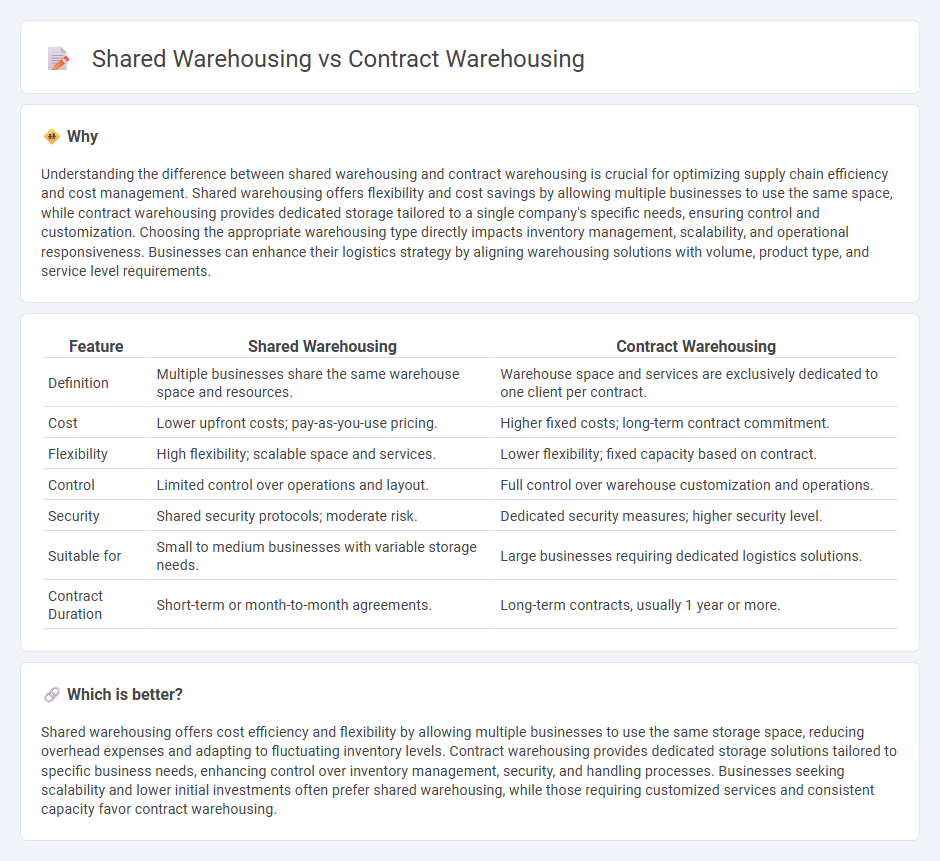
Shared warehousing offers businesses flexible storage solutions by allowing multiple companies to share space, reducing costs and improving scalability. Contract warehousing involves dedicated storage tailored to a single client's specific needs, often providing enhanced security, customized services, and long-term stability. Discover more about how each warehousing model can optimize your supply chain management.
Why it is important
Understanding the difference between shared warehousing and contract warehousing is crucial for optimizing supply chain efficiency and cost management. Shared warehousing offers flexibility and cost savings by allowing multiple businesses to use the same space, while contract warehousing provides dedicated storage tailored to a single company's specific needs, ensuring control and customization. Choosing the appropriate warehousing type directly impacts inventory management, scalability, and operational responsiveness. Businesses can enhance their logistics strategy by aligning warehousing solutions with volume, product type, and service level requirements.
Comparison Table
| Feature | Shared Warehousing | Contract Warehousing |
|---|---|---|
| Definition | Multiple businesses share the same warehouse space and resources. | Warehouse space and services are exclusively dedicated to one client per contract. |
| Cost | Lower upfront costs; pay-as-you-use pricing. | Higher fixed costs; long-term contract commitment. |
| Flexibility | High flexibility; scalable space and services. | Lower flexibility; fixed capacity based on contract. |
| Control | Limited control over operations and layout. | Full control over warehouse customization and operations. |
| Security | Shared security protocols; moderate risk. | Dedicated security measures; higher security level. |
| Suitable for | Small to medium businesses with variable storage needs. | Large businesses requiring dedicated logistics solutions. |
| Contract Duration | Short-term or month-to-month agreements. | Long-term contracts, usually 1 year or more. |
Which is better?
Shared warehousing offers cost efficiency and flexibility by allowing multiple businesses to use the same storage space, reducing overhead expenses and adapting to fluctuating inventory levels. Contract warehousing provides dedicated storage solutions tailored to specific business needs, enhancing control over inventory management, security, and handling processes. Businesses seeking scalability and lower initial investments often prefer shared warehousing, while those requiring customized services and consistent capacity favor contract warehousing.
Connection
Shared warehousing and contract warehousing both optimize logistics by providing flexible storage solutions that reduce operational costs and improve supply chain efficiency. Shared warehousing allows multiple businesses to utilize the same facility on a pay-as-you-go basis, while contract warehousing offers dedicated space and customized services for long-term tenants. This connection lies in their ability to enhance inventory management, streamline distribution processes, and adapt to varying business demands within the logistics sector.
Key Terms
Dedicated Space
Contract warehousing offers dedicated space exclusively tailored to a single client's inventory, ensuring greater control over storage conditions, security, and inventory management. Shared warehousing involves multiple clients sharing the same storage area, which can lead to cost savings but less customization and potential space conflicts. Explore the key differences to determine which warehousing solution best suits your supply chain needs.
Cost Structure
Contract warehousing typically involves fixed costs such as long-term leasing agreements, dedicated storage space, and customized services tailored to a specific client's needs, leading to higher upfront expenses but predictable budgeting. Shared warehousing offers variable costs with clients paying only for the space and services they use, which reduces financial risk and enhances scalability for smaller businesses. Explore detailed comparisons to understand which warehousing cost structure best fits your operational goals.
Flexibility
Contract warehousing offers fixed storage space and tailored services aligned with long-term agreements, prioritizing stability but limiting flexibility for fluctuating inventory needs. Shared warehousing provides flexible space and scalable solutions, allowing businesses to adjust storage capacity and services based on real-time demand without long-term commitments. Explore the benefits and limitations of each warehousing model to determine the ideal fit for your supply chain requirements.
Source and External Links
Understanding Contract Warehousing - Contract warehousing allows businesses to lease storage space and logistics services from a third-party provider, offering customized solutions for inventory management and shipping logistics.
Contract Warehousing (What is It & How Does It Work?) - Contract warehousing involves a third-party logistics provider storing goods for clients, often with long-term agreements and various value-added services such as handling and fulfillment.
Contract Warehousing - Weber's contract warehousing services provide a customized approach to warehousing operations, focusing on site selection, warehouse design, automation, and operational efficiency tailored to specific business needs.
 dowidth.com
dowidth.com